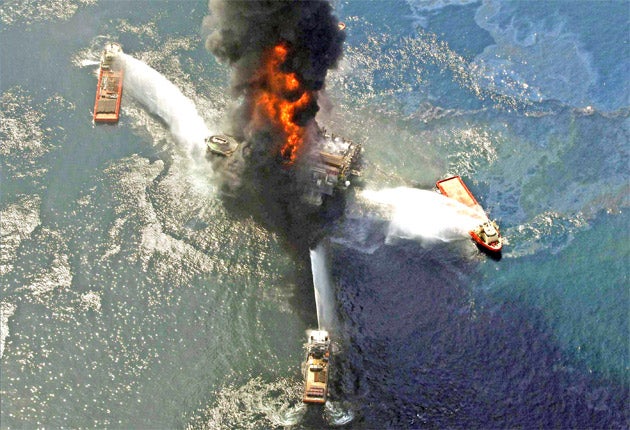BP executives brace for a stormy meeting with shareholders
Scores of people plan to protest today at the oil firm's AGM

Annual general meetings are sometimes stormy affairs, but the tempest swirling around the London AGM of the oil giant BP this morning looks unprecedented.
At least half a dozen vociferous and angry groups are set to lay siege to the British Petroleum board and its American chief executive, Bob Dudley, when they go through the annual ritual of facing their shareholders at the Excel convention centre in London's Docklands.
Fishermen and women from the Gulf Coast in the United States who were hit by the oil spill that followed the explosion of BP's Deepwater Horizon rig will be joined in protests at the meeting by indigenous communities who are angry about the company's involvement in tar sands extraction in Canada.
The corporate world will also be sending protesters, as some powerful shareholders are far from happy with BP's new £11bn tie-up with the Russian oil giant Rosneft, which involves controversial Arctic drilling, a massive share swap and has run into trouble.
Much anger is focused on the fact that BP has gone straight from one risky, difficult and controversial project – deep-water oil-drilling in the Gulf of Mexico – into two more in Canada and Arctic Russia. There is also anger over senior executives' pay and bonuses, including the potential final remuneration of Tony Hayward for 2010; he presided over the company at the height of the Gulf crisis before being replaced by Mr Dudley. A raft of shareholders' organisations are set to vote against the company's remuneration.
A separate demonstration is planned by workers involved in a dispute at a BP-owned biofuels plant at Saltend who say they have been "locked out" of the contract to build the new plant after the project fell behind schedule.
Most eye-catching may be the actions of protesters from the Gulf of Mexico fishing community, whose businesses were shut down during the oil spill. They will include Diane Wilson, who fishes commercially and is from Seadrift, Texas. She had to be dragged out of a US Senate hearing on the oil spill last year after pouring a jar of syrup made to look like oil over herself. "I want to give a voice to an outrage and make it clear that these corporations need to be held accountable for what they do," Ms Wilson, 62, said yesterday. "I have three charges against me, have been banned from Washington DC and I could face 800 days in jail. Yet no one from BP has been charged with anything."
Other North American protesters will be staging demonstrations about BP's involvement in the extraction of oil from Canada's tar sands, which is regarded as environmentally damaging. Melina Laboucan-Massimo, from the Lubicon Cree First Nation in northern Alberta, said her community opposed BP's "in-situ" extraction, a water-and-gas-intensive process in which steam is pumped into the ground to extract bitumen too deep for open-cast mining.
She said her community's rights – enshrined in treaties originally signed with the British – to hunt, fish and gather plants were being eroded by the oil extraction, which was scaring off wildlife or making it unfit to eat and draining rivers and estuaries of water. The tar sands are also generating huge amounts of carbon emissions, she said.
"The fact that BP is still insistent on developing another risky development, the fact that they are still willing to take that risk, is pretty alarming," she said.
Bob Dudley
BP's softly spoken chief executive grew up just 70 miles from the Mississippi coastline devastated by the influx of his company's oil last year. But whatever happens today, the furious shareholders and protesters are not the toughest foe he has faced. In 2008 he was ousted as head of BP's Russian subsidiary, TNK-BP, following a boardroom coup. According to secret US government files published by WikiLeaks, he said he was then forced to move from country to country "as a precaution".
An increasingly politicised dispute saw the modern-day KGB raid TNK's offices in Moscow and a court refuse visas to BP staff. Mr Dudley left Russia in haste when his visa was not renewed, saying later he had faced "sustained harassment" from the Russian authorities.
Drafted in after the Deepwater Horizon explosion, the chemical engineering graduate – like thousands who combed the Gulf of Mexico's coast with shovels and absorbent pads – is no stranger to clearing up other people's mess.
Subscribe to Independent Premium to bookmark this article
Want to bookmark your favourite articles and stories to read or reference later? Start your Independent Premium subscription today.

Join our commenting forum
Join thought-provoking conversations, follow other Independent readers and see their replies